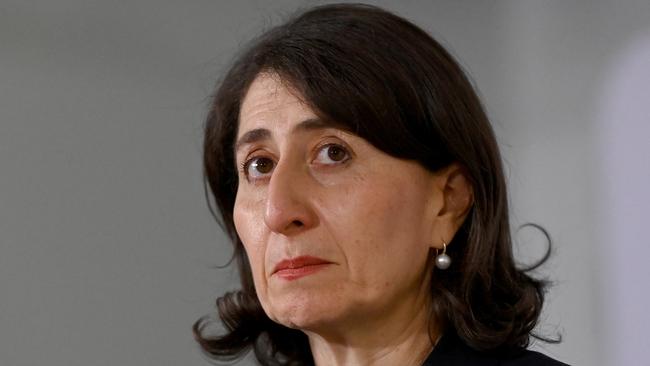Conflicts and code breaches meant Gladys had to go


The testimony from former premier Mike Baird torpedoed any chance that Berejiklian would emerge from ICAC’s 10-day hearings with her credibility intact. Baird, scrupulous in his approach to public duties, was clear that Berejiklian should have disclosed her relationship with disgraced former boyfriend Daryl Maguire.
Baird confirmed that he expected ministers to divulge actual or potential conflicts of interest to cabinet. But Berejiklian did not reveal her relationship with Maguire when cabinet’s expenditure review committee was considering making grants to the Australian Clay Target Association ($5.5m) and the Riverina Conservatorium of Music ($30m) in Maguire’s electorate of Wagga Wagga.
When Baird learnt of the Berejiklian-Maguire relationship, he was “incredulous”. The former premier told ICAC last week that he “certainly” believed the relationship “should have been disclosed”. He added: “The concept of executing public function, in the context of potential private interest, it would have been good practice that it should have been disclosed.”
Former deputy premier John Barilaro told ICAC on Monday that he had not been aware of the Berejiklian-Maguire relationship until it was revealed last year. If it were known, he said, Berejiklian “could not have been part of the decision or the debate” regarding the gun club grant, and the government “would have managed it differently”.
Stuart Ayres, the Trade and Industry Minister, agreed. He supported the grant to the gun club but thought Berejiklian’s conflict of interest should have been divulged. “It would have been a prudent course of action for a then-treasurer to declare her relationship so that any actions to avoid or manage conflicts could have been taken,” he said last week.
It has been clear since the Maguire relationship was revealed that Berejiklian breached the Ministerial Code of Conduct, which is a regulation under the ICAC Act. The code, as I have explained (“Berejiklian should have stepped down a year ago”, October 5, 2021), requires ministers to divulge the “pecuniary and other interests” of any person they are in an “intimate personal relationship” with. What is the point of having such a code of conduct if it is ignored by ministers?
ICAC’s Operation Keppel is investigating whether Berejiklian engaged in conduct that “constituted or involved a breach of public trust by exercising public functions in circumstances where she was in a position of conflict between her public duties and her private interest” given her “personal relationship” with Maguire.
The six days of hearings so far – which continue this week – have been very damaging for Berejiklian’s integrity. Documentary evidence and sworn testimony of former political advisers and public servants indicate Berejiklian, as treasurer and premier, supported and prioritised these grants even though they fell short of the cost-benefit assessment set by the government when assessing such proposals.
Nigel Blunden, an adviser to Baird, wrote a memo recommending the gun club proposal be opposed. “Gladys and Ayres want it,” he wrote. “No doubt they’re (sic) done a sweetheart deal with Daryl, but this goes against all the principles of sound economic management.” He referred to it as a vanity project for Maguire and invoked the Tom Cruise movie, Risky Business. “Sometimes you gotta say WTF,” he wrote.
Office of Sport director Michael Toohey thought the initial business case for the gun club was “flimsy” and “deficient”, and found the urgency placed on determining the grant to be “extremely unusual”. He would have raised the potential conflict of interest between Berejiklian and Maguire had he known about it at the time.
Paul Doorn, an executive director in the Office of Sport, recalled being given one day to prepare a funding submission for the gun club. He did not think it “stacked up” and was “surprised” it was supported. He said the relationship between Berejiklian and Maguire would have been a “red flag” and he too would have raised it. Chris Hanger, deputy secretary in the Department of Regional NSW, who worked on both the gun club and concert hall proposals, had doubts about whether they met the benchmark for overall benefit to the state. He also would have put in place procedures to manage “conflicts of interest” had he known about the Berejiklian-Maguire relationship.
It is understandable that many observers do not regard Berejiklian’s failings as corrupt conduct. There is no suggestion that she financially benefited from the funding given to the two organisations under scrutiny or from any of Maguire’s business dealings. That these matters are being considered by the anti-corruption commission may imply the possibility of corruption.
However, we cannot dismiss Berejiklian’s failure to disclose her secret relationship with Maguire as is required under the Ministerial Code of Conduct. Nor can we dismiss the evidence presented to ICAC that suggests Berejiklian supported the two grants and did not manage the conflict of interest when they were being considered by the cabinet committee.
ICAC is also investigating whether Berejiklian engaged in conduct that “was liable to allow or encourage the occurrence of corrupt conduct” by Maguire. This is also a serious offence. Phone recordings reveal that Berejiklian discussed Maguire’s business dealings and maintained her relationship with him even after he had resigned from parliament in disgrace.
Those who accused ICAC of running a witch-hunt or operating as a star chamber or kangaroo court to bring down a premier have been badly mistaken in their judgments. In reality, it was inevitable Berejiklian would have to resign ever since the Maguire relationship was revealed. When Berejiklian returns to the witness box at ICAC later this week, she will have a lot of explaining to do.


Nobody should be in any doubt whatsoever that Gladys Berejiklian did the right thing by resigning as NSW premier. The Independent Commission Against Corruption hearings have already demonstrated that Berejiklian breached the high standards of probity and integrity that we should expect from all politicians, especially premiers.